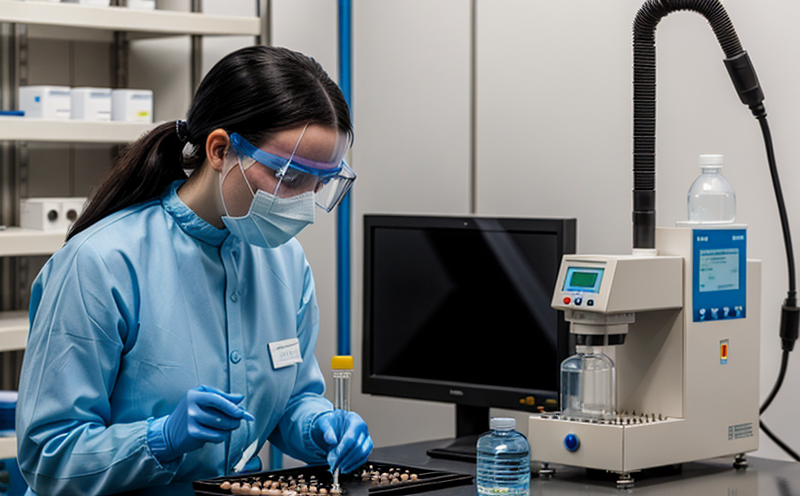Excipient Interaction Impurity Profiling Testing
In the pharmaceutical industry, excipients play a critical role in ensuring drug product stability and efficacy. These inert substances are used to improve the physical properties of a formulation or to facilitate manufacturing processes. However, impurities within these excipients can lead to potential risks during drug development and production. Excipient Interaction Impurity Profiling Testing is designed to identify and quantify trace impurities that may arise from excipients, which could otherwise go unnoticed in routine analyses.
Impurities in excipients are not always detectable through standard testing methods. For instance, the presence of residual solvents or degradation products can significantly impact drug stability and safety. This service focuses on advanced analytical techniques capable of detecting even trace levels of these impurities. The test involves a comprehensive evaluation of the excipient’s purity profile and its interactions with active pharmaceutical ingredients (APIs).
The process begins with thorough sample preparation, ensuring that the excipient is in a form suitable for analysis. Chromatographic methods such as High-Performance Liquid Chromatography (HPLC) or Gas Chromatography-Mass Spectrometry (GC-MS) are utilized to separate and identify individual components of the excipient. This allows us to pinpoint any unwanted impurities that could affect drug performance.
Once identified, these impurities undergo a series of stability studies to assess their impact on API properties over time. These tests simulate real-world conditions under which the drug may be exposed, such as temperature and humidity variations. The data collected helps determine whether the excipient is suitable for long-term storage without compromising drug integrity.
The importance of this testing cannot be overstated, especially when considering regulatory compliance requirements like those outlined by the International Conference on Harmonization (ICH). Compliance with guidelines such as ICH Q3D and Q6A ensures that drugs meet stringent quality standards set forth by health authorities worldwide. By adhering to these regulations, pharmaceutical companies can ensure patient safety while maintaining product efficacy.
Our team of experts employs state-of-the-art instrumentation to deliver accurate results consistently across all samples analyzed. This includes using advanced software packages designed specifically for quantifying trace impurities in complex matrices like excipients. Our laboratories are equipped with cutting-edge analytical equipment, ensuring reliable detection limits down to parts per billion (ppb) levels.
To further enhance accuracy, we also incorporate orthogonal methodologies where appropriate – meaning multiple techniques are used concurrently or sequentially to cross-validate findings. This approach minimizes the risk of false negatives while providing robust evidence supporting our conclusions about excipient purity and potential interactions with APIs.
In summary, Excipient Interaction Impurity Profiling Testing serves as a vital tool in safeguarding drug quality throughout development stages. By identifying and managing impurities early on, manufacturers can mitigate risks associated with suboptimal formulations or contaminants that might otherwise slip through conventional testing processes.
Why It Matters
The significance of excipient interaction impurity profiling cannot be underestimated in the pharmaceutical industry. Impurities within excipients can have profound effects on drug stability, efficacy, and safety. For instance, residual solvents left behind after manufacturing processes or degradation products resulting from storage conditions could potentially alter how an API behaves once incorporated into a final dosage form.
- Stability Issues: Trace amounts of certain impurities can catalyze reactions between excipients and APIs, leading to instability issues. This might manifest as reduced shelf life or altered chemical properties that render the drug ineffective.
- Safety Concerns: Some impurities found in excipients are known irritants or allergens. If not properly controlled during formulation stages, they could cause adverse reactions when administered to patients.
- Efficacy Impairment: When impurities interact with APIs, it can change their dissolution rate or bioavailability, thereby affecting how well the drug works within the body.
Given these potential consequences, thorough analysis of excipient purity is essential. It enables manufacturers to make informed decisions regarding formulation choices and process optimization efforts aimed at enhancing overall product quality.
Why Choose This Test
Selecting the right testing service for excipient interaction impurity profiling is crucial for ensuring reliable results that meet both internal standards and external regulatory requirements. Our laboratory offers several advantages over other providers:
- Advanced Analytical Techniques: We utilize industry-leading analytical tools such as HPLC, GC-MS, Fourier Transform Infrared Spectroscopy (FTIR), and Nuclear Magnetic Resonance (NMR) to achieve precise quantification of impurities down to ppb levels.
- Comprehensive Reporting: Every test comes with detailed reports that not only list detected impurities but also provide insights into their potential impact on drug performance. These reports are tailored specifically for your organization's needs, whether you're a quality manager or an R&D engineer.
- Certified Personnel: Our staff consists of highly skilled scientists who possess extensive experience in pharmaceutical analysis. They stay updated with the latest trends and technologies through continuous training programs conducted by industry leaders.
- Regulatory Compliance: All our tests are performed according to recognized standards such as ICH guidelines, ensuring that you receive results that comply with global regulatory frameworks applicable to your region.
We understand that choosing the best testing service can be challenging. That's why we strive to offer personalized consultations and recommendations based on your specific requirements. Whether you're concerned about impurities in a particular excipient or need help selecting appropriate analytical methods for your project, our team is here to assist you every step of the way.





